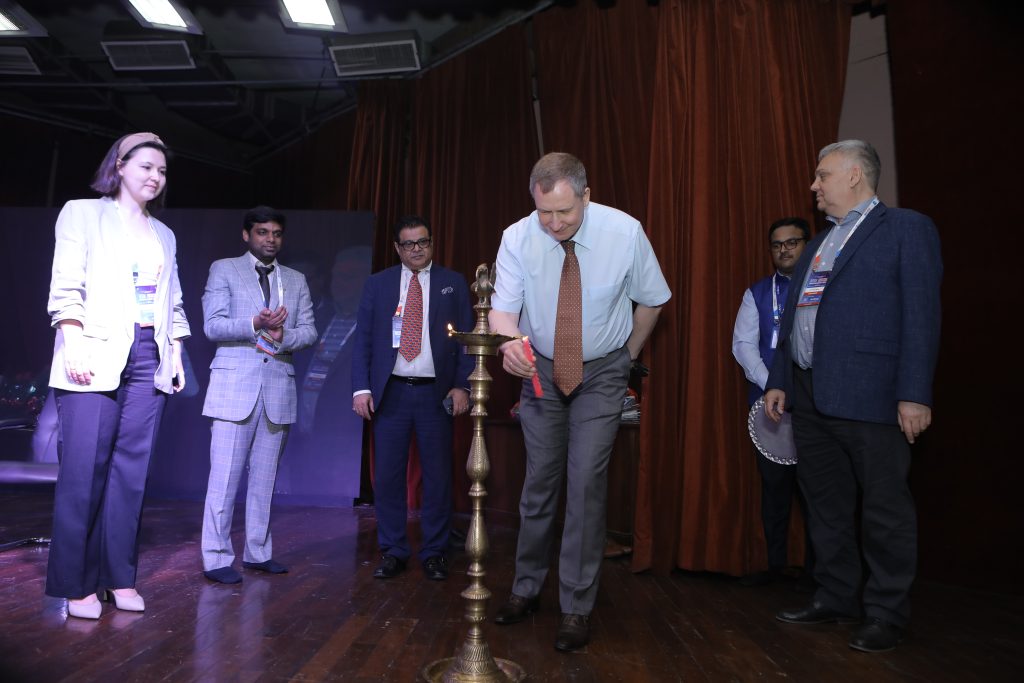India and Russia have maintained strong strategic ties and nowhere is this more evident than in the realm of space. Participants at the first edition of the India-Russia Space Dialogue, held at the Russian Cultural Culture to mark 75 years of space cooperation between the two nations, saw people from both countries speak about what the two nations had achieved and what more could be done going forward.
Elena Malysheva, granddaughter of Russian cosmonaut Yuri Malysheva who went into space with Wing Commander Rakesh Sharma as the spacecraft’s commander, highlighted the spirit of cooperation and dwelt on where India and Russia could best work together in space.
“Space cooperation between India and Russia will only develop going forward as there is a deep history of cooperation in space between our two countries. India is making its contribution to the development of space while Russia has a very good base in manned and non-manned cosmonautics. The focus as I see it will be unmanned space exploration and satellite launches. I really hope that we also look at cooperation in joint manned flights as well going forward,” Malysheva said through an interpreter.
The India-Russia space history is a long one and April, as the speakers pointed out, is a very special month in space history for both nations. Sudheer Kumar N., Director, Capacity Building & Public Outreach (CBPO), ISRO pointed out that it was on April 12, 1961 when Russian cosmonaut Yuri Gagarin became the first human to journey into outer space while on April 3, 1984, Wing Commander Rakesh Sharma gladdened Indian hearts by becoming the first Indian to enter space aboard a Soviet rocket. The commonality of the months aside, Kumar said that through the decades both nations have ambitions to explore space further which they have realised by working together.
“Both countries harbour common ambitions to journey deeper into space and they have done this through jointly working on many projects like Gaganyaan, Marsoplane – the mission to explore Mars and so on. Certainly, the 75 years of Indo-Russian cooperation provides valuable lessons that are important to further explore the unexplored areas of Indo-Russian Space partnership,” he said.
But while the rich history of space cooperation has so far remained, others point out that the geopolitics of the Ukraine war and India’s recent moves towards privatisation of the space industry could be factors that might affect the India-Russia space cooperation. Lt Gen Anil Kumar Bhatt, Director General, ISpA stated that while Russia had historically been a “strong partner” for India taking an active role in key milestones of India’s space history whether it was the launch of the Aryabhata satellite or the launch of Bhaskara-I or Rakesh Sharma’s space journey there were questions that needed to be asked as to how best to take the space relationship forward.
“We look forward to any alignment with Russia because space is for the world. All our companies are going into upstream, downstream and midstream activities and we believe Russia can certainly play a role here. Having said this, we must also note that when it comes to commercial space, Russia has not yet opened up its space sector to the private sector as we have done,” he said.
Lt Gen. Bhatt’s remarks give one pause for thought. India and Russia have cooperated well together but it is clear both nations are entering a phase of their partnership where key questions need to be answered. How much will the fallout of Western sanctions hit Russia’s space agency? Can India count on Russia to the same extent as it did in the past? Finally, how will Russia’s space agency, which is primarily state-owned, adapt to working with private players not just based in India but across the world? These questions will determine the new chapter of the India-Russia space relationship going forward.
——-
Interview: Lt Gen Anil Kumar Bhatt, Director General, IspA
‘We have to fight future battles today where the whole earth is transparent’
What do you make of India’s new Space Policy?
The space policy with its emphasis on privatisation is a great opportunity. If you see the current statistics, we are only 2.3 percent of the global space economy and we need to have a larger share of the pie. This will happen only when private players come into the mix.
What are the concerns that privatisation of the space sector could bring?
The concern could mostly be strategic. Space has made everything transparent. You cannot hide and you cannot stop anyone’s satellite be it of a friend or an enemy. We have to fight future battles today where the whole earth is transparent and private players will play a bigger role here. You could see this in the Ukraine war when private companies were able to take out photos of tanks and other moments. This has changed our security paradigm. Today, the space domain has become a very important domain in warfare. Apart from land, air, and sea, the space and cyber sectors are the most important areas that needed to be safeguarded.
How would you then ensure security while also ensuring development through the private sector is not hindered?
The juggling between safeguarding national security and ensuring it doesn’t come at the cost of development will be much debated and here is where the right balance is required. The private sector should have a role in the dual use of technology which is communication, remote sensing navigation which is ISR, and PNT (Position, Navigation and Timing). This is there both in the civil and military sectors. However, when one talks about the whole domain of fighting a space war it will be led by defence agencies and it will be more controlled.


